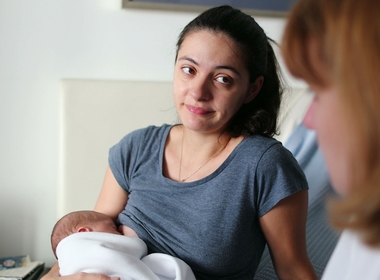Discover how fertility challenges and assisted conception can impact perinatal mental health. Explore emotional wellbeing before, during, and after pregnancy, with guidance and resources to support your journey.
Jump to: Before pregnancy | During pregnancy | Pregnancy loss | After pregnancy | Final reminder
Trying to conceive and navigating fertility treatment or assisted conception can deeply affect your emotional wellbeing, before, during, and after pregnancy.
The journey to parenthood may be filled with anxiety, grief, and other complex emotions, especially if you undergo assisted fertility cycles, experience pregnancy loss, or face a high-risk pregnancy. For many, the emotional impact starts long before pregnancy begins.
Understanding how fertility challenges and assisted conception can affect perinatal mental health is crucial, and it is important to seek support or guidance if needed.
Around 1 in 6 couples worldwide experience fertility difficulties. This includes heterosexual couples, people in same-sex relationships, and those who are single. There are many reasons people turn to assisted conception to grow their families.
Whatever your reasons, trying to conceive with support from fertility services can become all-consuming. It may involve complex decision-making, physical and emotional stress, and financial strain.
While treatments like in vitro fertilisation (IVF), intrauterine insemination (IUI), donor conception, or surrogacy offer hope, they can also introduce unique stressors that affect your mental health.
Mental health concerns and fertility struggles often go hand-in-hand, which is why so many fertility clinics have in-house specialist counselling services.
If you are going through this with a partner, try to communicate openly about how you're both feeling. Seeking support from organisations like Fertility Network UK or a peer support group can make a big difference too. Relationship counselling may also help you both communicate more effectively, giving you the best start on this journey.
For those who become pregnant after fertility treatment, the long or challenging path to conception may make it harder to relax or feel joy, even if things are going well. There is a common belief that any anxiety will end once you are pregnant, but for many people this is simply not true.
Some IVF or assisted pregnancies are more closely monitored, which can make you feel even more vulnerable. You may worry about test results, your baby’s development, or the potential effects of fertility medication. Even if your pregnancy isn’t considered high risk, your anxiety may still be heightened.
You may experience the following:
This is all very common. Reassurance from medical professionals, and connecting with others who have experienced similar journeys, might help you manage some of the stress or anxiety you’re feeling.
To ease your worries, it might be helpful to try mindfulness and relaxation techniques like meditation, breathing exercises, or, if it is safe for you, yoga.
Losing a baby through miscarriage or stillbirth is devastating at any time, but after a long or difficult conception journey it can feel particularly cruel.
Pregnancy loss and perinatal mental health are closely connected, and it’s vital to give yourself time and space to grieve.
After pregnancy loss, you may experience:
If you have had a termination for medical reasons (TFMR), this deeply emotional, difficult and complex decision can lead to shock, disbelief, sadness and other conflicting feelings. It is important to seek advice and support from a professional.
Seeking support from a Maternal Mental Health Service, private bereavement counsellor or a specialist charity such as The Miscarriage Association, Tommy’s, Sands or Saying Goodbye might help you process your feelings.
After a baby is born, the emotional impact of assisted conception or fertility struggles may continue. The intense focus on becoming a parent can leave little time to emotionally prepare for when the baby is actually here. It can be especially confusing and worrying if you're not instantly overjoyed or in love with your new baby like you so often see on social media, in films or on TV.
Perinatal mental health conditions can affect anyone, regardless of how long they waited or tried to become a parent. Parenthood may not feel like you expected it to, and this may leave you feeling robbed of an experience you have longed for.
You may notice:
Perinatal mental health conditions are common, affecting around 1 in 4 women and birthing people and 1 in 10 dads and partners during and/or after pregnancy. Speak to your midwife, health visitor, or GP if you think you might be affected.
Go to our Treatment and support page for more information about the help available to you.
Whether your path to parenthood involves fertility treatment, donor conception, surrogacy, or other forms of assisted conception, your emotional needs are important.
There is no right or wrong way to feel. Whatever your journey to parenthood looks like, you deserve compassion and space to look after your mental health.
Support is available at every stage. Acknowledge how you feel and reach out for help when needed.
See our Infertility and perinatal mental health blog, or visit Fertility Network UK for more information and support.
The Maternal Mental Health Alliance sends heartfelt thanks to the women and clinicians who generously gave their time to review and offer feedback on our information.
Find out more about perinatal mental health, treatment and support.

Learn about perinatal mental health conditions, including signs, symptoms, and causes.

Discover treatment options for perinatal mental illness, including therapy, medication, peer support, and specialist care.

Learn how conditions like hyperemesis gravidarum, pelvic pain, and sleep deprivation can affect your mental wellbeing, plus tips for managing these challenges.
Published: May 2025 Next review: May 2028